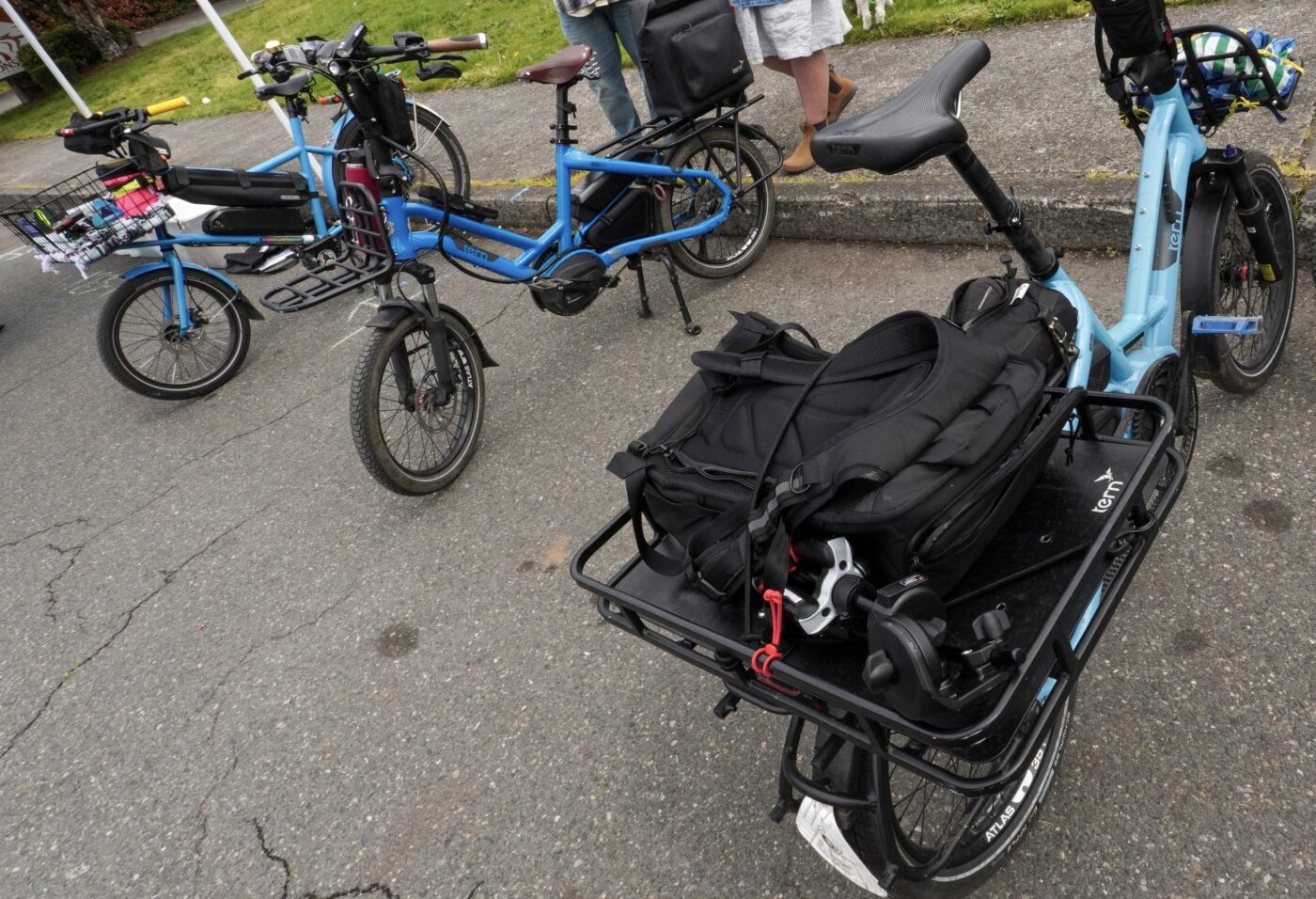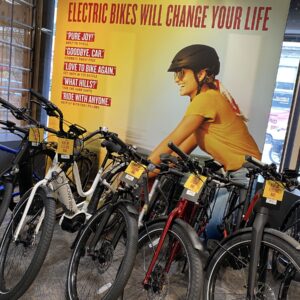
The full draft of the Portland Clean Energy Fund Climate Investment Plan (CIP) is now available and it offers more details on what could be Portland’s first rebate program for electric bicycle purchases.
And if all goes according to plan, the PCEF aims to help fund the purchase of at least 6,000 e-bikes over five years.
PCEF is a relatively new source of funding managed by the Bureau of Planning & Sustainability (BPS) that is derived from a 1% tax on large retailers. Revenue from the tax must be spent on projects and programs that reduce carbon emissions and mitigate the impacts of climate change on the most vulnerable communities. Back in March we shared the news that PCEF would allocate $20 million from its $750 million five-year investment plan on an e-bike rebate program.
The significant amount of interest in this program from bike riders has been tempered by the fact that we didn’t really know too much about how the program would shake out. Now we do.
In the new CIP draft, BPS points out that e-bike rebates are a priority for PCEF in part because of the relatively high cost of e-bikes, their potential to dramatically reduce greenhouse gas emissions, and the fact that, “Women and BIPOC community members have stated through surveys that they feel less vulnerable on e-bikes than on pedal-only bicycles.”
According to the new draft, the rebate will be available to income-qualified households (less than 80% of the area median income) and it can be used only at local bike retailers. In order to qualify as a participating dealer, a shop must have a brick-and-mortar location in Portland and provide both sales and service. Here are some other new details:
- Cargo e-bikes and adaptive electric bikes will receive a higher incentive.
- People receiving rebates will also be able to use a fixed amount of funds for bike safety equipment, locks, and gear.
- The exact rebate amounts will be determined through market research, evaluation of needs, and interaction with other potential programs.
- The rebate program will be implemented in parallel with education and outreach by community-based organizations to PCEF priority populations about the e-bike opportunity, including information about safe riding, route-finding, charging, and storage.
- An early program evaluation will include recommendations for a pilot program for allocating funds for safe e-bike storage and charging needs for existing multifamily properties.
In addition to the $20 million over five years, PCEF will allocate an additional $600,000 to reach workforce development goals. They hope the funding leads to training and retention of 50 new e-bike mechanics in the community.
As part of their outreach for the initial CIP draft, BPS heard concerns from the public about theft of e-bikes and charging needs for people who live in apartments and/or who ride them to work. They also heard some folks worried about the cost of ongoing e-bike maintenance. They might seek to address those concerns in future drafts. Other ideas that came up were grants for community groups to manage fleets of e-bikes at low-income housing complexes.
BPS is still gathering public feedback on the latest draft. You can attend a virtual listening session this Thursday (6/1), comment via their online survey, or email cleanenergyfund@portlandoregon.gov.







Thanks for reading.
BikePortland has served this community with independent community journalism since 2005. We rely on subscriptions from readers like you to survive. Your financial support is vital in keeping this valuable resource alive and well.
Please subscribe today to strengthen and expand our work.
Fire up the lithium mine.
Do the metal alloys used to build a bike grow on trees?
PS: Only about 1-2% of the material in a lithium battery is lithium and alternatives to lithium are already becoming widely-available (e.g. sodium ion batteries).
You need to remember that these bikes can be a car replacement for many people. The fair comparison is between the environmental impact of a car vs an e-bike.
I love e-bikes. I really do. But the fact that Portland has a fund (the PCEF) that has $750 MILLION to spend on this and things like $ 1 million to a newspaper to build a new office, nearly gave $12 million to a convicted fraudster an multiple other questionable grants bogles the mind. Because at the same time we have city council members proposing a new household tax to fund basic transportation improvements, we have a dysfunctional 911 system, an understaffed police force, trash throughout the city, and unsanctioned camping destroying our neighborhoods and ruining lives. It’s time for voters to say enough is enough and redirect these PCEF funds to essentials that once made Portland a great place to live. We no longer have the $ to fund $750 million of mostly wasteful fluff.
Portland awarded $12M clean energy contract to executive with long history of financial misdeeds, unpaid taxes – oregonlive.com
Instead of funding what may be worthy (but are often questionable) projects we need to get back to funding essentials in the city of Portland.
Look at this list. When one thinks of the lack of funding for PBOT safety improvements the stuff on this list make one nauseous.
2022 PCEF Grant Recipients (RFP #2, awarded July 2022) | Portland.gov
Great find! I had been looking for something like this and wondering if they even bothered tracking the money they give away. To see it in black and white like this is heart breaking.
Not too surprising, the smallest grant goes to something that will actually directly help people……
“Bikes for Humanity PDX Free Bikes for Portlanders in need $20,000”
Metro “regional government” can start by cleaning the bike gutters the tax slaves use to get to their place of enslavement…
My primary gripe with that list of recipients is that they don’t really detail what the projects are. Even worse, some of them cryptically refer to what the project might be (heat pump, etc), but most don’t. The public can’t evaluate the projects if they don’t give us any detail.
Doesn’t BIKETOWN already address mobility and upkeep issues?
Now we just need to make the bike infrastructure usable again. I’m tired of seeing bike lanes littered with last season’s hazards and watching off street paths slip from our grasp. Without looking I’ll guess that Rubio runs BPS so that can’t happen while it helps bureaus run by Mapps and Ryan. Am I wrong?
Edit: I was correct
Update: when I made that comment yesterday I was thinking specifically about conditions the Columbia Slough Trail and thought of saying I’d have to take my chances with the trucks on Schmeer. Ironically, I got run off the pavement by a pickup driver barreling down the path just a few hours later.
I am not easily intimidated by bullies but this was not a game of chicken. And I’m so numb to these by now that when I got to safety I reached for my phone to text my girlfriend and vent. Only after that did calling 911 cross my mind. If you were one of the several who ignored a grubby looking dude with cargo bike porn quantities of mulch on his bike trying to flag you down at Vancouver and Lombard, don’t say I didn’t warn you.
Lower income people getting subsidized e-bikes????/???????
Another disgusting example of how the woke mind virus is eroding family values and leading to degeneracy and societal apocalypse. Only respectable people with good moral standards should get e-bikes subsidies. (/s)
So, an e-bike from REI may not be eligible
This sounds like it can be achieved by expanding the biketown fleet and the biketown-for-all program. No reason to duplicate an existing service.
The PCEF has so much money they don’t know what to do with it. Duplication of service is a way for them to get money out the door. Really embarrassing how much of a mess this program is.
Better not get your white male hopes up.
Discrimination is written into every aspect of the PCEF.
This thread and lack of actual involvement, understanding and engagement with PCEF is unproductive at best and is hopefully my last glimpse into the comment section of a great website.
Sorry but my take on PCEF is that it’s a woke slush fund and our tax dollars could be put to much better use (like real PBL’s throughout the city) but more importantly provididng basic essential services to Portlanders. Do you know something about PCEF that the rest of us are missing? (It’s unfortunate voters were duped on this one…sort of like the Preschool Tax, Measure 110–although we did wise up on the capital gains tax 26-238!)
This e-bike rebate program by the Portland Clean Energy Fund is such a forward-thinking initiative! I remember when my neighborhood implemented a similar, albeit smaller, program and the uptick in e-bike usage really revitalized the community, making it both greener and more connected. It’s especially encouraging to see the focus on inclusivity and supporting lower-income households, as well as the attention given to e-bike maintenance and theft concerns.
I’m thrilled to see Portland taking such a proactive stance on clean energy and accessibility with the e-bike rebate program. A couple of years back, I was part of a community project that piloted e-bikes in a lower-income neighborhood, and the impact on residents’ mobility and quality of life was transformative. The focus on funding training for e-bike mechanics not only makes this a sustainable initiative but also creates job opportunities—fantastic foresight!
Reading about Portland’s Clean Energy Fund setting a goal of 6,000 e-bikes through a rebate program is truly uplifting. As someone who struggled to afford transportation in the past, initiatives like these resonate deeply with me. It’s heartening to see efforts being made to make sustainable transportation options more accessible to everyone, especially marginalized communities who often bear the brunt of environmental injustices.